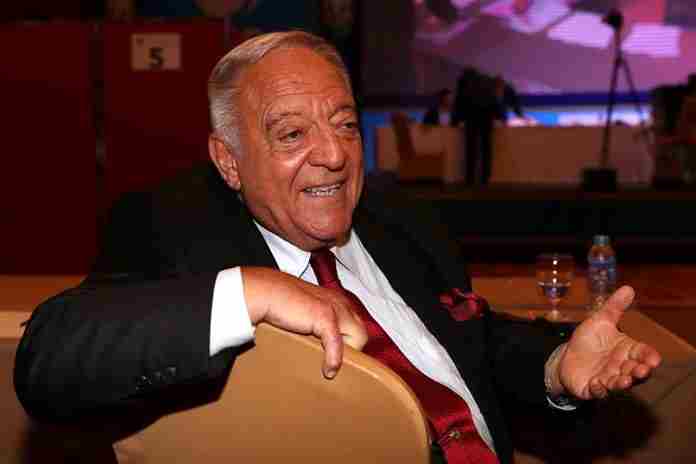The latest news, notes and quotes from the worldwide Five-Ring Circus:
● Weightlifting ● An era ended on Wednesday, as International Weightlifting Federation chief Tamas Ajan (HUN) formally resigned his office, bowing to internal pressure before he could be expelled by the federation itself.
Owing to his continuing activities as IWF President while he is under investigation of allegations made in January in a German ARD television documentary, including managing IWF financial accounts, speaking for the federation in meetings with the International Olympic Committee and interfering with the work of Acting President Ursula Papandrea (USA), Ajan’s retirement was approved by the IWF Executive Board Wednesday.
The IWF statement noted that “As part of his retirement, Ajan has tendered his resignation from the position of IWF President with immediate effect.” ARD reported that the Executive Board had, in fact, voted to expel him, but Ajan retired before the vote was announced.
Said Papandrea in the statement, “The IWF thanks Tamas Ajan for more than four decades of service to weightlifting, and most notably for his work in recent years to ensure an anti-doping programme which meets the standards of the IOC and WADA is in place. We can now begin the work of determining a fresh path towards achieving the full potential of our sport.”
Ajan, now 81, had an amazing career in international sport, becoming the Secretary General of the IWF in 1975 and President in 2000, winning five elections for the sport’s top position. He succeeded Austrian Gottfried Schodl, whose passing (at age 96) was announced by the IWF on Tuesday (14th). Schodl was also a long-time IWF chief, serving as president from 1972 through 2000. Ajan was, for 10 years, a member of the International Olympic Committee.
One of the positive attributes of Ajan’s stewardship was a determination to maintain strong financial reserves, recognizing the precarious position of weightlifting in the Olympic Games due to its outrageous doping record. The last set of financial statements posted on the IWF Web site showed that at the end of 2017, the federation had almost $35 million in reserves against a typical annual expenditure of about $4 million a year (a quarter of which goes for anti-doping activities).
Ajan saw the IWF through a possible elimination from the Olympic program for 2024 and has been returned by the IOC to regular status, although with increased scrutiny for the future. After the Tokyo Games, the IWF will once again be entitled to an IOC payment of about $15.37 million.
Papandrea and the IWF Board will now be able to focus on the administration of the Olympic competition in Tokyo, on the results of the continuing investigation of the allegations made in the ARD documentary, and eventually on removing the federation’s affairs from Ajan’s Budapest office to the IWF’s listed office in Lausanne (SUI).
It will also, no doubt, undertake more serious promotion of the sport; the federation’s Web site is one of the worst among all of the International Federations, but given the sport’s long history, could be one of the most interesting.
● International Olympic Committee ● In the aftermath of his brilliant interview in Welt am Sonntag, where he brushed aside a lengthy series of accusatory questions about his stewardship of the Olympic Movement, and especially the postponement of the Tokyo 2020 Games, IOC President Thomas Bach is now being hailed as a possible “president for life”?
You could get that impression from no less than ARD documentary boss Hajo Seppelt (GER), who tweeted on Tuesday:
“I would not exclude anymore that Bach will find claqueurs who will desperately ask whether he would be ready to stay longer in charge as the maximum of 12 yrs (means until 2025) and that there could be a majority to adopt the IOC regulations for a Lex Bach”
Seppelt’s tweet in German was a bit less – shall we say – respectful (per Google Translate)
“How long will this man stay IOC President? I no longer consider it out of the question that he will find claqueurs who wish him to last for a maximum period (until 2025 = 12 years) and officially adjusted (Putin style 😉 regulations.”
Seppelt’s ARD associate, Grit Hartmann, chimed in with:
“Anything but that Bach naturally extends his term of office would be the surprise. By 2024/25 – what difference does that make? And: There isn’t a single opponent in sight, is there?”
Bach, for his part, told the Welt am Sonntag that he hadn’t made up his mind whether to run for an additional four years as IOC President in 2021. However, there is no doubt that he will be re-elected for an extended term … at this point.
Comment: Although Seppelt and Hartmann are supremely sure of their opinions, what is true is that there is no such thing as a sure thing.
● Gymnastics ● A small development in the USA Gymnastics case in the U.S. Bankruptcy Court for the Southern District of Indiana, where the motion by several insurers to delay the time to file objections to the federation’s plan for reorganization was granted. The new due date for the filings is 30 April 2020.
This isn’t going to be concluded anytime soon.
● Football ● Former FIFA Secretary General and President Sepp Blatter (SUI) was back in the news this week.
First, one of the two charges against him filed by Swiss prosecutors was dropped, in specific an allegation that he deliberately arranged the below-market sale of television rights to the 2010 and 2014 FIFA World Cups to FIFA Vice President Jack Warner (TTO), allowing the latter to make millions off the sale to an actual broadcaster. There is still the matter of a $2 million payment to former UEFA chief Michel Platini (FRA) … for no apparent reason!
Then on Wednesday, Blatter – now 84 – suggested that the United States could serve as a replacement organizer for the 2022 FIFA World Cup, in view of a U.S. Department of Justice indictment made public last week that indicates that both Russia (for 2018) and Qatar (for 2022) paid bribes to secure their selection as host countries.
In comments to German magazine Sport Bild, Blatter noted:
“Germany could do it. But this would mean the World Cup being staged in Europe again after 2018.
“Europe therefore would not be first choice. The United States could do it instead of 2026. They are capable, it’s not rocket science! Japan could also do it. They also bid to host the 2022 World Cup.
“Fortunately, the 2022 World Cup will only have 32 teams and not 48 as [FIFA president Gianni Infantino] had planned. The organisational effort would not be bigger than 2018.”
As one might imagine, the Qatar organizers were not pleased with the comments.
Blatter has maintained his innocence continuously since resigning as FIFA President in 2015, and expects to be named as “Honorary President” once his name is cleared. Not likely.
● Cycling ● The centerpiece of the cycling world is, of course, the annual Tour de France. That race was postponed on Wednesday, from a 27 June to start to 29 August and finishing on 20 September … at least for now.
As the UCI World Tour calendar has been wiped out by the coronavirus, the importance of the Tour de France has been highlighted. A Tuesday story from Agence France Presse warned of a possible “economic meltdown” in the sport if the Tour is not held in 2020.
Said Jean-Francois Mignot, a demographics expert for the French National Centre for Scientific Research and a Tour de France historian, “Cancellation opens the door to a possible economic meltdown in the cycling sector. …
“Most sponsors are in cycling for this reason alone, the whole thing is centered around the Tour de France. If these sponsors invest money it is because television viewers recognize the team jerseys, it is the only cycling race watched by such a vast audience.”
According to Groupama-FDJ boss Marc Madiot, “It’s as simple as this. If the Tour does not take place, teams could disappear, riders and staff alike would find themselves unemployed.”
The French government has prohibited mass gatherings until mid-July at the earliest, although there has been discussion that since the economic impact of the Tour de France is primarily vested in its television audience, the event could be held without spectators. Riders who have had to put up with spectator clowns getting in their way on dangerous uphill climbs probably won’t mind having a clean path … for once.




















